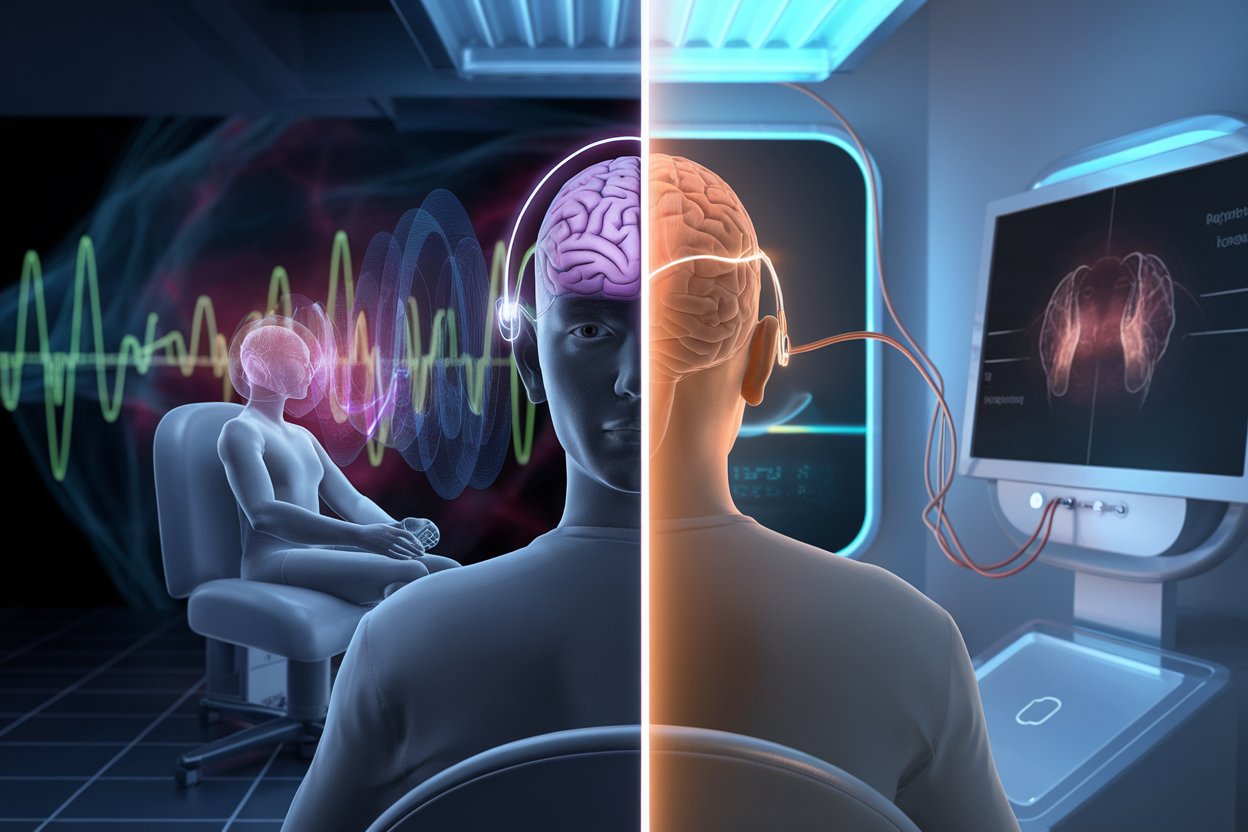Adding TMS therapy to your mental health treatment plan is a tough choice. When thinking about cannabis’s role in this journey, the most important things to do are to get professional help, be honest with your healthcare provider, and think carefully about how using cannabis fits in with your treatment goals and overall health. Let’s be clear about why this approach might not be the best for your treatment’s safety and effectiveness.
What You Should Know About TMS Therapy
Magnetic fields are used in transcranial magnetic stimulation to help nerve cells in the brain work better. It was made especially for people who haven’t gotten better with traditional depression treatments. It’s kind of like a gentle, non-intrusive push to help the brain better handle mood.
TMS Therapy and Weed: Understanding the Interaction
It can be hard to figure out how to get mental health treatment, especially if you want to use TMS therapy and marijuana at the same time. Let’s break it down into the most important parts so you have all the data you need to make smart choices.
The Role of Weed in Mental Health
Many people use weed, which is also called cannabis or marijuana, to unwind or calm down. Long-term relief isn’t thought to be possible for people with serious mental illnesses. Knowing how it impacts your mind and body is very important, especially if you are thinking about other treatments.
Combining TMS Therapy and Weed: What to Consider
Before mixing any treatments, here’s what you should ponder:
Impact on Treatment Effectiveness
First, scientists are still looking into how marijuana might affect how well TMS therapy works. Because both have effects on the brain, it’s important to be careful with this mix and always talk to a doctor.
Communication with Your Doctor
Second, it’s important to be honest with your healthcare provider. Telling them about your weed use can help them customize your treatment plan, making sure it is safe and effective. They’re not there to judge, just to help.
Legal and Medical Considerations
Third, know what the laws are in your area about using marijuana and what medical effects it might have. Laws and health care suggestions based on new research are very different.
TMS Therapy and Weed Together: Good or Bad?
So, what happens if someone is using weed and starts TMS therapy? Here are some things to think about:
- Doctors’ Advice: It’s super important to tell your doctor if you’re using weed. They need to know everything to help you in the best way.
- Feeling Better: Some people might think weed helps them feel better, but it’s not a cure. TMS therapy is a treatment that doctors recommend for long-term help.
- Safety First: Your doctor will talk to you about how weed might affect your TMS therapy. They want to make sure everything is safe for you.
Going to Treatment High: Not Recommended
If you’re thinking about TMS therapy as a way to treat your mental health problem, it’s important to know if you can go to sessions while high. There is clear agreement among health care professionals: coming to treatment high is usually not a good idea. This is why:
Impact on Treatment Efficacy
- Interference with Brain Activity: TMS therapy works by targeting specific areas of the brain to regulate mood. Cannabis, which also alters brain activity, can interfere with this process, potentially diminishing the effectiveness of the treatment.
- Assessment Accuracy: Being under the influence can affect your ability to accurately report symptoms and experiences, making it harder for your healthcare provider to gauge the therapy’s effectiveness.
Safety Considerations
The higher chance of having bad side effects is something to think about if you’re thinking about going to TMS therapy while high on drugs, alcohol, or other substances. Here are some more reasons why this is a big problem:
Amplified Side Effects
- Sensitivity to Treatment: Introducing any substance into your system that affects brain chemistry can alter your sensitivity to TMS therapy. This means that the usual settings for TMS might produce stronger or more unpredictable effects when your brain is under the influence of drugs or alcohol.
- Compounded Reactions: While TMS therapy has a relatively low risk of side effects under normal circumstances, being under the influence of substances can complicate the body’s response. This can lead to an increased chance of experiencing discomfort, headaches, or other physical reactions during or after the session.
- Physical Reactions: Cannabis can affect physical responses and sensations, which might complicate the administration of TMS therapy and the monitoring of any side effects.
- Mental State: Arriving high could alter your mental state, potentially impacting how you perceive and respond to the treatment session.
Smoking Weed After TMS Therapy: Things to Consider
The time after TMS therapy is very important for many people because their brains are still processing the effects of the treatment. There are a few things you should think about if you want to use cannabis after TMS therapy:
The Brain’s Adjustment Period
- Ongoing Neural Changes: After TMS therapy, your brain is still adjusting. Introducing cannabis could influence these adjustments, potentially affecting the long-term outcomes of the treatment.
Personal Health and Treatment Goals
- Reflect on Objectives: Consider why you’re pursuing TMS therapy and your goals for treatment. Evaluate how using cannabis aligns with these objectives and discuss your thoughts with your healthcare provider.
Monitoring Effects
- Observe Changes: If you choose to use cannabis after TMS therapy, closely monitor any changes in mood, behavior, or symptoms. Sharing these observations with your healthcare provider can help tailor your treatment plan.
Professional Guidance is Key
- Consult Your Provider: Before making any decisions about cannabis use before or after TMS therapy, have a conversation with your healthcare provider. They can offer guidance based on the latest research, your health history, and how cannabis might interact with your treatment.
The Ideal State of Mind for TMS Therapy
Getting into the right frame of mind before starting TMS (Transcranial Magnetic Stimulation) therapy isn’t just a suggestion; it’s a necessary part of finding your way to health with ease and success. Let us talk about the best way to think and feel before and during your TMS sessions so that you can get better mentally as quickly as possible.
Present, Participative, and Prepared
- Fully Present: Being fully present means showing up without the haze of substances like cannabis, alcohol, or other drugs clouding your perception. A clear mind ensures you can accurately communicate your feelings and experiences, allowing for precise adjustments and a tailored treatment approach.
- Active Participation: TMS therapy is a collaborative process. Being in a state that allows for active participation means you’re engaged, providing feedback, and working with your healthcare provider to optimize treatment outcomes.
- Prepared for Change: A positive and open mindset, ready for the changes that TMS therapy may bring, sets a strong foundation. Understanding that mental health improvement is a journey—with its ups and downs—prepares you to navigate this path with resilience.
Physical Readiness: Rested and Responsive
- Well-Rested: Ensuring you are well-rested before each session can enhance your body’s and brain’s responsiveness to treatment. Sleep quality directly impacts mental health and the brain’s ability to adapt and change—a principle called neuroplasticity, which is central to TMS therapy’s effectiveness.
- Substance-Free: A body free from the recent effects of alcohol, recreational drugs, or non-prescribed medications is crucial. This substance-free state supports the brain’s natural chemistry and electrical activity, allowing TMS therapy to work without unnecessary interference.
Emotionally Equipped: Anxiety and Expectations
- Managing Anxiety: It’s natural to feel a bit anxious about starting a new treatment. However, facing this anxiety without the buffer of substances means you can directly address these feelings through the therapy itself or with supportive counseling.
- Realistic Expectations: Coming to treatment with a hopeful yet realistic perspective on what TMS can achieve is important. Understanding that improvement often occurs gradually helps maintain motivation and compliance throughout the treatment process.
Navigating Toward Clearer Horizons
It’s like setting sail on calm waters when you go into TMS therapy with a clear mind, a body ready for change, and a strong emotional outlook. This ideal state makes the journey more effective, bringing the goal of better mental health one step closer with each session.
It might be tempting to think that combining TMS therapy with cannabis would make the effects stronger or happen faster, but this is not something that should be done without careful thought. As there isn’t enough clear clinical evidence to say how TMS therapy and cannabis should be used together, it’s best to talk to medical professionals who know your health history and how each treatment works. This makes sure that any treatment plan is made to fit your needs, which improves safety and effectiveness.
FAQs About TMS Therapy and Weed
1. Can I use weed while getting TMS therapy?
It’s really important to talk to your doctor about this. They will give you the best advice based on your health.
2. Will weed affect how well TMS therapy works?
It could. That’s why sharing this with your doctor is key. They need to know everything to help TMS therapy work its best.
3. Is it safe to use weed with TMS therapy?
Safety is the number one thing. Your doctor can tell you if using weed is okay with TMS therapy for you.
4. What should I tell my doctor about using weed?
Tell them everything. How much you use, how often, and why. This helps them take care of you.
Ready to Talk About It?
If you’re thinking about TMS therapy and using weed, the best step is to talk with professionals who know all about it. American TMS Clinics are here to listen and help guide you on what’s best for your health.
Contact American TMS Clinics in Phoenix Arizona today to get all your questions answered and learn more about how TMS therapy can help you feel like yourself again. Let’s make a plan together for your health and happiness.
Sources List
- American Psychiatric Association: Guidelines on the use of TMS therapy.
- National Institute on Drug Abuse (NIDA): Information on marijuana and its effects.
- Journal of Affective Disorders: Research on the effects of substances like marijuana on depression treatments.





